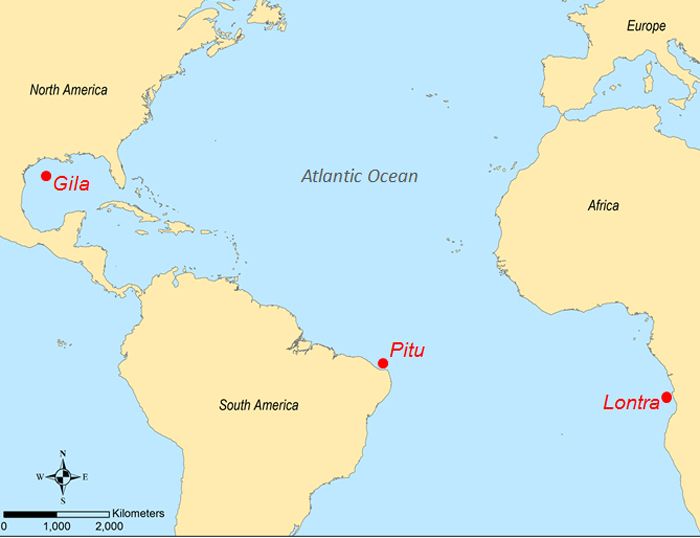BP Holdings Press Releases: BP 4Q 2013 Exploration Highlights
> Gila is BP’s third significant Paleogene discovery in the US Gulf of Mexico.
> Pitu discovery opens up a new deepwater frontier in the Brazilian equatorial margin.
> Write-off of around $850 million of costs allocated as part of the accounting for the acquisition from Devon, triggered by the unsuccessful Pitanga well in Brazil.
> Lontra discovery and successful well test increases confidence in BP’s exploration programme in the Angolan pre-salt.
> Exploration momentum has returned in 2013: 15 exploration wells completed so far; 9 exploration wells currently operating; 7 potentially commercial discoveries in India, Egypt, Angola, Brazil, US Gulf of Mexico.
BP today said that 2013 had been its most successful year for new field exploration for almost a decade. During the year, BP has participated in 15 completed wildcat exploration wells which have resulted in seven potentially commercial discoveries, giving a new field exploration success rate of over 40%.
Lamar McKay, chief executive of BP’s Upstream said: “Exploration is at the heart of BP’s upstream strategy. The successes and opportunities now being delivered through our increased exploration activity confirm our confidence in our ability to sustain BP’s resource base. This success is being mirrored in improved operating performance delivery across BP’s upstream business.”
BP’s latest exploration find, announced today1, is the Gila discovery in the Keathley Canyon area of the Gulf of Mexico. This is the third significant discovery BP has made in the Paleogene play in the Gulf of Mexico in recent years, following Kaskida in 2006 and Tiber in 2009. Gila is some 25 miles to the west of Tiber. BP is operator and holds an 80% interest in the discovery well.
BP also today confirmed the recently-announced Pitu oil discovery in the frontier deepwater of the Potiguar basin off Brazil’s equatorial margin, announced yesterday by Petrobras2. The Pitu well (1-RNS-158), on Block BM-POT-17, is operated by Petrobras and is still active. In July, BP announced its farm-in to a 40% interest in the block subject to final regulatory approval by the ANP3.
BP also announced that the BP-operated Pitanga exploration well on Block BM-CAL-13, in the Camamu-Almada basin offshore Brazil, had encountered oil shows but no commercial quantities of oil or gas. This result will cause BP to relinquish the BM-CAL-13 block.
BP deepened its equity in the Gila prospect and accessed the BM-CAL-13 lease as part of the acquisition of Devon Energy’s interests in the Gulf of Mexico, Brazil and Azerbaijan, announced in 2010.
The Pitanga well result will trigger a write-off of around $230 million related to the costs of drilling the well, as well as a write-off of around $850 million associated with the value allocated to this block as part of the acquisition accounting related to the Devon deal, which BP expects to treat as a non-operating item.
In addition, earlier this month Cobalt International Energy announced4 the results of a drill stem test on the Lontra oil and gas discovery in the pre-salt play of Angola, in which BP holds a 30% interest. The well recorded a flow rate of 39 million standard cubic feet of gas a day and 2,500 barrels of condensate a day on a 40/64” fixed choke, demonstrating the excellent quality of the reservoir.
Reflecting on recent results, Mike Daly, BP’s executive vice president exploration commented: “The exploration results that BP has seen in the fourth quarter alone include a new play opener in a frontier basin offshore Brazil, together with discoveries in emerging plays in our production heartlands of Angola and the Gulf of Mexico. We are very pleased that both these frontier and core portfolios are starting to deliver and anticipate leaving the year with nine further wells operational, sustaining our recent momentum into 2014.”
Map showing locations of Gila, Lontra, and Pitu:

Forward-looking statements - cautionary statement:
This press release contains certain forecasts, projections and other forward-looking statements regarding the potential commerciality of BP’s discoveries in 2013; BP’s expectations that it will relinquish the BM-CAL-13 block in Brazil; the amount of write-offs that will be triggered by the Pitanga well result; the expected number of further wells that will be operational by the end of 2013; and BP’s prospects for momentum into 2014. By their nature, forward-looking statements involve risk and uncertainty because they relate to events and depend on circumstances that will or may occur in the future. Actual results may differ from those expressed in such statements, depending on a variety of factors including the timing and receipt of governmental and regulatory approvals; future levels of industry product supply; demand and pricing; the timing and nature of maintenance outages; operational problems; economic and financial conditions generally or in various countries and regions; political stability and economic growth in relevant areas of the world; changes in laws and governmental regulations; regulatory or legal actions; the development and effective use and maintenance of new technology; the effectiveness and security of our digital infrastructure; the actions of competitors, trading partners, creditors, rating agencies and others; natural disasters and adverse weather conditions; changes in public expectations and other changes to business conditions; wars and acts of terrorism, cyber-attacks or sabotage; and other factors discussed under “Principal risks and uncertainties” in our Stock Exchange Announcement for the period ended 30 June 2013 and under “Risk factors” in our Annual Report and Form 20-F 2012 as filed with the US Securities and Exchange Commission.
By using this site you agree to this Privacy Policy. Learn how to clear cookies here
Boomers vs USA Fast Approval Unsecured Business Loans 为什么说学好英语4个单位至关重要? dphaianh The Original Tacoma Barbershop Zowin Farm Buying a Home According to Haney Garcia Realty Group, and then some Readers' travel tips: affordable wellness holidays Home Based Business Tips And Strategies That Work